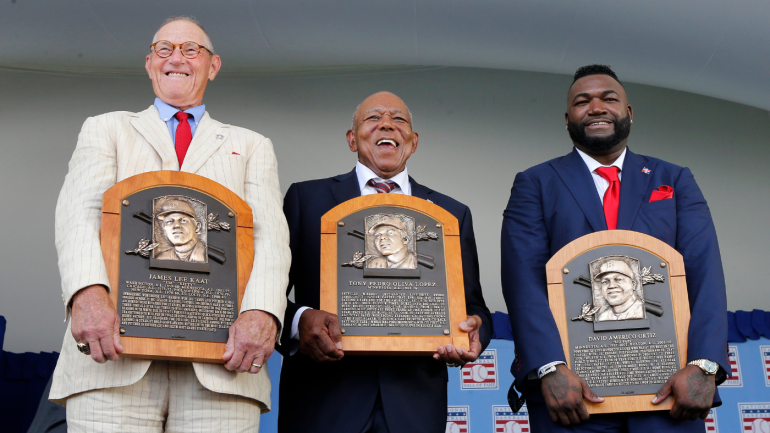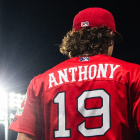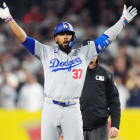
A quasi-annual tradition here in these parts during Hall of Fame discussion season is shooting down myths. When I first did this, I didn't realize I'd have to continue to try and hammer these points home so many times, but here we are. S wWhat have I been seeing bouncing around this year that needs to be shot down?
How can voting totals change?!
This happens every year. Some of the time it comes from a person who just doesn't know how the process works and it's a genuine question. Other times, it's presented in condescending fashion as a means of mockery toward the voters. On that point, a Hall of Fame voter this year said the following about Billy Wagner:
How did he get that much better in nine years? Did some researcher discover 50 more saves?
See? Everyone else is stupid because a vote percentage has steadily risen. That's the only explanation, right?
The actual explanation has several components.
The most important here involves the voting rules. Voters are only allowed to check a maximum of 10 boxes. Given this, it's a feather in Wagner's cap that he survived the first vote.
He joined the ballot for the 2016 Hall of Fame class. The following now-Hall of Famers were on that ballot: Ken Griffey Jr., Mike Piazza, Jeff Bagwell, Tim Raines, Trevor Hoffman, Edgar Martínez, Mike Mussina, Alan Trammell, Lee Smith, Fred McGriff and Larry Walker. That's 11. Isn't it possible there were voters out there who thought Wagner deserved a Hall of Fame vote but chose 10 names from the above? It should also be pointed out there are a few more players from that ballot who didn't make the Hall of Fame, such as Barry Bonds, Roger Clemens, Curt Schilling, Sammy Sosa, Mark McGwire, Jeff Kent and Gary Sheffield. Throw in Wagner and that's a ridiculous 19 names worthy of strong consideration. Oh, and Jim Edmonds and Nomar Garciaparra were also there, so we could probably bump that to 21.
Again, voters were only allowed a maximum of 10 votes there.
Now compare that group to the ballot from this year. It dwarfs the current one. That alone is an easy justification for Wagner to garner a lot more support than when he first came on the ballot.
Also of importance here is that the voting body is ever-changing. Just to use one small example: I'm a first-time voter and I voted for Wagner. There's +1 for him even though he didn't earn another save! See how that works? Just keep in mind there are dozens of cases like this every single year. The younger generation of voters probably has more appreciation for the one-inning save artist, too.
Finally, people change their minds over time and that isn't a conspiracy. As I said last year, "we've seen targeted campaigns for the likes of Bert Blyleven, Tim Raines, Edgar Martinez, Larry Walker and Rolen that worked." I wasn't sure on Bobby Abreu at first and now I'm a voter of his. I didn't vote for Félix Hernández this time around but I've already seen some pretty compelling arguments that are making me wonder if I made a mistake and should rectify it next year.
No one bought a ticket to watch him play
This utter madness was peddled last season about Adrian Beltré and I'm sure it's been applied to many players over the years.
First off, there's no possible way to prove this. Secondly, it's almost certainly false in every case of a great player. I've seen a person wearing a Chris Valaika Cubs jersey before. If there's a person out there going to games for Mr. Valaika (apologies to you, Chris, but I think you probably get the point being made here), you can sure as hell bet there were people going to games to watch Bobby Abreu, Chase Utley and Mark Buehrle.
Beyond that, it's a team sport anyway. I'm sure there are legions of fans out there who buy tickets to games to watch their favorite team instead of specifically thinking, "you know, I'm a Braves fan and I'm getting this ticket to watch Chipper Jones but NOT Andruw Jones!"
Hogwash argument. Do better.
The process is broken!
Now that nearly every individual ballot gets shared rather heavily on social media, there's a contingent of people who latch onto every ballot and critique it. This part is perfectly fine for me and I'm looking forward to getting skewered. No, where you lose me -- and it's becoming the biggest pet peeve -- is the suggestion, every single time you see a ballot you don't like, that "the process is broken."
Why? Because you disagree with someone? Think about how big someone's ego has to be to suggest a broken process at every individual disagreement.
I also often see, "that doesn't make any sense." The matter is subjective. Differing minds are going to arrive at conclusions with a different process. That's why most voters write columns explaining their ballots to go along with a social media post. It's so difficult to get to 75% agreement with any group of people on seemingly anything these days. It's very hard to get there and it should be.
By and large, while there are misses, I think the process is very good. Again, it's subjective and there will be disagreements. I think there have been bad misses and some of them come down to the 10-vote maximum. Two immediately spring to mind: Johan Santana and Kenny Lofton.
Still, being imperfect doesn't mean it's bad. The voting process is fine and having discussions about it for a month-plus every offseason is very good. I don't follow the other sports nearly as much as baseball, obviously, but I'm a big football and basketball fans and those Halls of Fame don't draw nearly as much conversation as baseball, in my experience. That's a good thing for us.
We can have those conversations without lamenting the voting process as "broken" on disagreements.
It's getting watered down! Everyone gets in!
Similar to the vote total point above, this one simply boils down to ignorance. It's usually said with condescension whenever a player makes the Hall of Fame and someone thinks that player isn't worthy. Here, I'll predict the social media comment ...
Billy Wagner made the Hall of Fame? They just let everyone in these days. It's so watered down it's a joke and that's why no one cares.
Yeah, that nonsense is coming. You'll see it somewhere if you look. And it is total ignorance.
These people either think the Hall of Fame is only or should only be the Babe Ruth, Johnny Bench, Rickey Henderson, Pedro Martinez, Cy Young tier. But it's so much more than that. We've got Buck Ewing, Chuck Klein, Jake Beckley, Joe Sewell, Heinie Manush, Ted Lyons and Red Ruffing, too.
Don't just take my word for it. With a big hat-tip to YES Network researcher James Smyth, here is the percentage of players by decade of their debut with at least 5,000 plate appearances or 2,000 innings pitched to make the Hall of Fame.
- Pre-1900: 22.1%
- 1900-09: 20.3%
- 1910-19: 23.2%
- 1920-29: 36%
- 1930-39: 19.5%
- 1940-49: 25.4%
- 1950-59: 22.1%
- 1960-69: 15.8%
- 1970-79: 11.4%
- 1980-89: 11%
- 1990-99: 8.6%
It should be noted closers aren't likely to get to 2,000 innings, but they are still such a low number and decently dispersed over the course of the last several decades (relievers below that benchmark in the Hall: Mariano Rivera, Goose Gossage, Trevor Hoffman, Lee Smith, Rollie Fingers and Bruce Sutter). Also, Joe Mauer last season was a 2000s decade debut. He is likely to be joined by Ichiro Suzuki and CC Sabathia this year, but so far it's just those three from the next decade and it's going to continue to add people in the coming years. No serious person should be arguing against Mauer, Sabathia or Suzuki anyway.
Regardless, just look at those numbers. Anyone who would say that the Hall of Fame is becoming watered down is totally oblivious to what has happened with the Hall, historically. You want to talk about watering everything down, look at the 1920s. Good grief, man.
We're doing just fine right now.
The story of baseball can't be told without him
Pete Rose, Roger Clemens and Barry Bonds aren't on the ballot. They aren't in the Hall of Fame, either. The arguments never go away, though, and it's understandable. You're talking about the players with the most hits in MLB history along with players who have a legitimate claim as the greatest pitcher and position player, statistically. We could loop other players in, but it's mainly these three when someone will cry, "if you can't tell the story of baseball without him, he's gotta be in."
I just don't think this is a valid argument because it's relying upon a strawman. Anyone reading this knows all about Rose, Clemens and Bonds. We don't need them to have an individual plaque in a museum to know how good they were. To the people making the argument: Do you really believe there's going to be someone visiting the museum who has no idea who Rose, Clemens and Bonds are, but if there were individual plaques that person would come away an expert on the three? For real? C'mon.
More importantly, there are exhibits other than the plaques. It's not like these three guys simply don't exist in Cooperstown.
Making the Hall of Fame is an individual honor and Rose drew a permanent ban for gambling on baseball. That keeps him out. Enough voters decided Bonds' and Clemens' ties to PEDs mean they don't deserve the individual honor. That's the risk they took when they decided to dabble with steroids.
Such is life.
An accounting of the greatest players ever would certainly include the three here, but that doesn't necessarily mean they have to get individual plaques. There isn't a person alive who would know nothing about the three without plaques but would be very well-versed on the trio if there were.

















